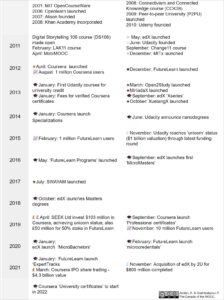Quelle: Weiterbildungsblog Autor: jrobes
In UK gibt es FutureLearn als große MOOC-Plattform und über 50 Hochschulen, die MOOCs anbieten. Die meisten in Partnerschaft mit FutureLearn. Das ist nicht vergleichbar mit Deutschland, wo MOOCs in den letzten zehn Jahren in der Hochschullandschaft nie richtig Fuß gefasst haben. Trotzdem bietet der Artikel eine Reihe interessanter Stichworte. Denn sein Ausgangspunkt bildet die Frage, ob und wie Hochschulen heute das Thema Online-Lernen strategisch aufnehmen. Dazu gehört aus Sicht des Autors Neil Mosley auch eine kritische Bestandsaufnahme ihrer MOOC-Aktivitäten. Die er übrigens, relativ nüchtern, auch in UK nicht unbedingt als Erfolgsgeschichte präsentiert.
Wie auch immer: Neil Mosley bietet den Hochschulen vier MOOC-Szenarien an: „revenue and brand awareness“, „furthering the research agenda“, „furthering the teaching agenda“ und „supporting lifelong and professional learning“.
„Nevertheless, as we enter a new era for online education, one in which there seems to be more universities developing partnerships to offer an online portfolio of courses, it will be interesting to observe whether MOOC platform partnerships will play a role in that and what this ultimately begins to look like.“
Neil Mosley, Blog, 27. Mai 2022
Bildquelle: Micah Boerma (Pexels)
